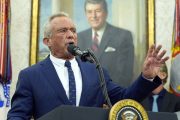
On June 16, Texas Governor Greg Abbott signed legislation that would almost completely ban abortions in the state should the Supreme Court ever invalidate the 1973 Roe v. Wade decision, which allows for abortion in the United States. House Bill 1280, also known as the Human Life Protection Act, will take effect if the Supreme Court “wholly or partly” overrules Roe v. Wade or if a constitutional amendment ever allows states to ban abortions.
The law is what is known as a “trigger bill,” and would go into effect 30 days after a ruling invalidating Roe v. Wade or constitutional amendment allowing abortion bans triggers the new law.
Exceptions are in place if there are risks to the mother’s life or if there could be a “substantial impairment of major bodily function.”
The new law would make it a second-degree felony to attempt to perform an abortion. If the abortion is successful and the baby dies the penalty would rise to a first-degree felony, which could potentially lead to a life sentence. Besides the possible jail time, Abortionists could lose any medical license they might have and be subject to fines of up to $100,000.
Women who seek abortions are immune from prosecution under the terms of the law.
Since a constitutional amendment allowing states to ban abortion seems unlikely, the most likely way for the bill to become law is if the Supreme Court invalidates all or part of Roe v. Wade. In May, the high court agreed to hear the case of Dobbs v. Jackson Women’s Health Organization. That case involves a Mississippi law which forbids abortion after 15 weeks gestation. Roe v. Wade is at the heart of the case and all or parts of it could be overturned.
Many court watchers consider Dobbs v. Jackson Women’s Health Organization a direct challenge to Roe v. Wade.
“A favorable ruling would make Texas one of the first states to end abortions,” the bill’s author, state Rep. Giovanni Capriglione (R-Tarrant County) said.
Pro-life advocates were predictibly happy with the new law.
“We are extremely pleased at the passage of HB 1280,” said Dr. Joe Pojman, executive director of Texas Alliance for Life when the legislation was passed in May. “To whatever extent the Supreme Court allows states to protect unborn babies from abortion — whether at 15 weeks, six weeks, or at conception — the Human Life Protection Act will go into effect to the same extent.”
“The passage of the Human Life Protection Act is especially significant in light of the recent announcement of the United States Supreme Court to consider the Dobbs v. Jackson Women’s Health Organization case,” Pojman said.
Pro-abortion forces were typically outraged by Abbott’s signature on the bill.
“HB 1280 is different from and more extreme than most trigger bans — and goes against the majority of Texans’ support for safe, legal abortion. The bill would allow a total abortion ban to go into effect in Texas if the Supreme Court ‘partly’ overruled Roe or if the Court ‘partly’ gave the state the authority to prohibit abortion,” said Dyana Limon-Mercado, the executive director of Planned Parenthood Texas Votes, in a statement.
Limon-Mercado chastised the state legislature for focusing on abortion instead of other problems in the state saying, “members of the Texas Legislature prioritized abortion bans, attacks on trans kids, permitless carry and voter suppression bills. The people of Texas deserve better.”
Abbott and the Texas Legislature have been busy on the abortion front, having signed the Texas Heartbeat Act in May, which effectively bans abortions in the state as soon as a fetal heartbeat can be detected — which is often as early as four weeks into a pregnancy. That law is set to take effect at the beginning of September, although the bill is expected to face multiple legal challenges prior to its implementation.
In addition to the State of Texas taking action on abortion, several localities in the state — including Lubbock, a city of 260,000 residents — have acted to curtail abortion within their city limits. Lubbock has declared itself a “sanctuary city for the unborn.”
With the federal government currently held hostage by far-left ideologues, this is how the fight against the killing of the unborn looks for the time being. Yet there is a game-changer stratagem that the pro-life movement could start employing in a big way in its decades-long fight to end the barbarism of abortion. That stratagem is for states to recognize that Roe v. Wade is an unconstitutional overreach on the part of the Supreme Court, and to declare Roe unconstitutional within their state borders on the basis of nullification.
A report by the pro-abortion Guttmacher Institue released in April shows the palpable angst among the pro-abortion crowd. “2021 is on track to become the most devastating anti-abortion state legislative session in decades,” said Elizabeth Nash and Lauren Cross of the Guttmacher Insititute.
From their mouths to God’s ears.





